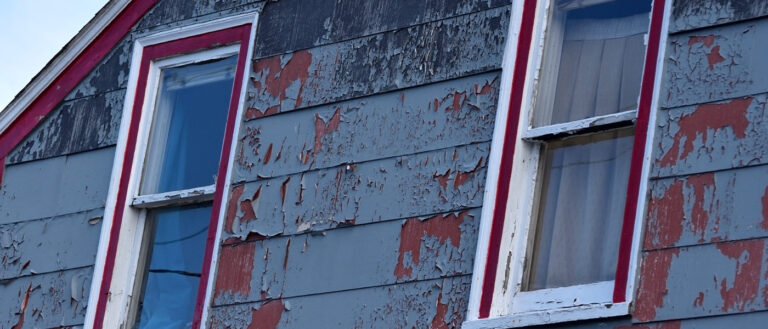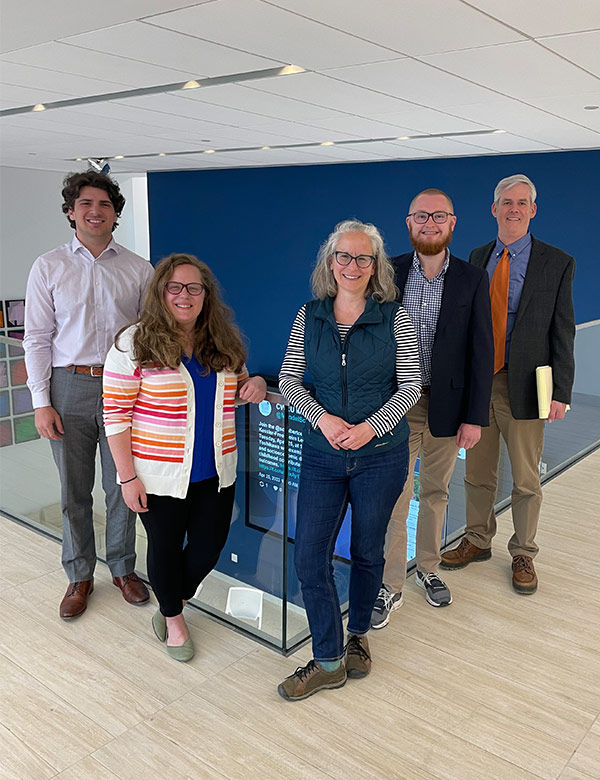
Establishing clear title allows residents stay in, improve their homes, contributing to neighborhood stability on Cleveland's East Side
It's a common problem in inner-city neighborhoods: An elderly parent dies, but the family home was never legally transferred to relatives.
The result is one form of what is known as a "tangled" title. Without a clear title-one in which ownership is clearly established-residents often encounter roadblocks when they try to mortgage, buy, sell, rent or transfer the property.
But three third-year students at the Case Western Reserve University School of Law, in partnership with the university's Jack, Joseph and Morton Mandel School of Applied Social Sciences, spent the last academic year creating a legal "blueprint" to help homeowners in Cleveland's Buckeye-Woodhill neighborhood stay in their homes by "untangling" their property titles.
Law students David Bauman, Austin Levan and Rebecca Kimmelfield hope it's a project that continues long after they graduate this spring.

"We targeted our efforts to the Buckeye-Woodhill neighborhood, but we were also thinking about how, eventually, this could be expanded in Cleveland," said Kimmelfield, a Shaker Heights native who will practice intellectual property law in Michigan. "I know the results will be well after my time at Case Western Reserve, but we were thinking big."
The students initially sought to help homeowners obtain federal funding for home improvements-thus making a greater impact on the neighborhood-but the effort became more complex.
"Imagine living with and caring for an elderly parent in the family home," said Matthew Rossman, who oversaw the students' work as director of the law school's Community Development Clinic (CDC). "That parent passes away, but you stay in the house because it's your home. You've been keeping up with the utility bills and mortgage payments, cutting the grass. But the title was never transferred and legal ownership was never established."
Rossman said the problem becomes especially complicated when liens have been placed on the property. All too often, he said, residents cannot secure mortgages or other financing; sometimes they are unable to remain in homes that have been in their family for generations.
Rossman's students started by researching efforts in other cities. The city of Philadelphia, for example, helps low-income individuals navigate the process of transferring titles; it even established a Tangled Title Fund to help homeowners defray the costs.
"We didn't find any local sources devoted to untangling titles, so we had to get creative," Levan said. "We found that the state's Save the Dream Ohio initiative offers a mortgage-assistance program that can provide up to $25,000 for unpaid mortgage bills and unpaid property taxes to low-income residents."
The students also identified utility bill assistance from the state, offering up to $10,000 in relief.
"That's important because those funds can clean up some of the liens," said Levan, who will practice tax and real estate law in Canton after graduation.
Perhaps the most important part of this work, the students said, is collecting and packaging this information to make it more accessible for residents struggling with tangled titles.
Their work will be handed down to the next group of students working within the Community Development Clinic.
"This project provides the opportunity for our students to devote more of the clinic's pro bono legal services to support neighborhoods close to University Circle," Rossman said.
Debbie Wilber, associate director and research associate at the Mandel School's National Initiative on Mixed-Income Communities (NIMC), said the effort is a great example of how multi-disciplinary collaboration can impact the local community.
The project is part of NIMC's broader role as lead coordinator for the Woodhill Choice Neighborhoods Initiative implementation, in partnership with the Cuyahoga Metropolitan Housing Authority and the City of Cleveland. The initiative is bringing 638 new housing units to the Woodhill-Buckeye community as well as multiple neighborhood-based critical community improvements. CWRU serves as the lead anchor institution on the initiative.
"By helping residents clear their title so they can do home repairs, which increase the value of their home, it allows them to stay in the community," Wilber said. "That is very much my hope-that the people in this community are able to stay, that their homes increase in value and they build wealth, that we minimize displacement even as the community changes."






